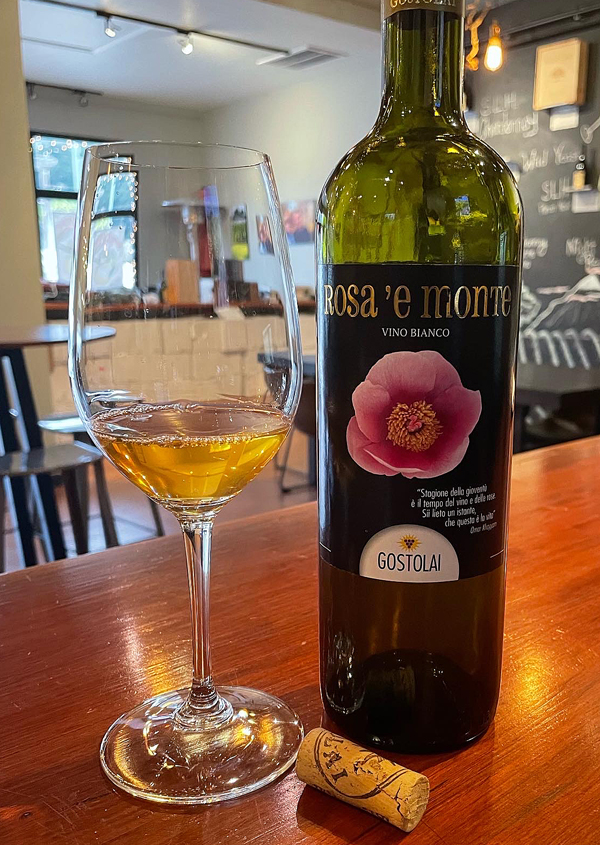2017 Cantina Gostolai, Rosa ‘e Monte, Vino Bianco Secco, Sardinia, Italy.
Based in Sardinia’s Nepente di Oliena, Cantina Gostolai is one of the island’s most interesting and influential producers, widely admired for their traditional and authentic wines and mostly for their beautiful Cannonau (Grenache) and Vermentino efforts, which I have only recently discovered, along with this rare and intriguing skin contact white blend Rosa ‘e Monte made mainly from an indigenous ancient varietal. This wonderfully textural and aromatic Rosa ‘e Monte white, is made outside of the regional and DOC rules, crafted from 70% Vernaccia di Oristano, an at least 3,000 year old local grape with no know relatives outside of Sardinia and 30% Vermentino that was fermented naturally with 24 hours of skin maceration and lees aged in stainless steel. The wine, which cannot be labeled with a year, is from the 2017 vintage and glows in the glass with a rich yellow/gold hued with a hint of amber, it fills the palate with a structured array of flavors and complexity, led by white stone fruits, preserved lemon, dried apricot and fleshy melon fruits that are nicely accented by mountain herbs, fennel, almond, verbena and a sense of tannin or gripping extract in a mineral crisp bone dry wine. This wine is joyously pleasing in the mouth, not at all funky or oxidative with a refreshing vibrancy and a stony finish, making it great to sip on and especially good with sea food, in this case I had it with Paella, that really suited this Mediterranean wine. This Vernaccia di Oristano grape can develop flor and be sherry like if desired, but this Gostolai version is clean and lively. It should noted that DNA testing has shown that there is a possible close genetic relationship of parent-offspring between Vernaccia di Oristano and the white Emilia-Romagna wine grape Santa Maria, though it looks it originally to have been born on Sardinina.
Sardinia has some of the longest history in wine growing of all of western Europe and while still controversy still persists, it could be the home or birth place of commercial wine trading in the Mediterranean, predating the Geeks, the Etruscans (who came to both Sardinia and Corsica) and likely thousands of years before the Romans. Gostolai fermented their Rosa ‘e Monte dry white was done completely in stainless steel, it was whole cluster pressed with the grapes allowed 24 hours of skin contact in temperature controlled vats. This skin contact allows for a touch more pigment, extract and that structure I mentioned above, enough to be noticeable on the palate, but without any hard edges, in fact this wine gains a vinous, almost oily silkiness with air and time in the glass. I was introduced to this winery by the Sardinia native and Italian sommelier Giuseppi Cossu, for which I am grateful as he has provided insights and history that I wouldn’t ever found on my own. Interestingly, ampelographers believe that the Vernaccia di Oristano grape, unrelated to the Vernaccia found in Tuscany, may be native to the Tirso river valley that crosses the island of Sardinia before emptying into the Gulf of Oristano, hence the name. This Vernaccia, first documented in 1327, was thought to have been introduced to the island of Sardinia by the Phoenicians, but grape seeds now have been found here that were over 3,000 years old, making it almost certainly that it here even earlier. The vines here are located at about a 1,000 feet of elevation on the Dolomite like granite based sandy soils on the the northeast side of Sardinia, that, as mention, is mostly known for their Vermentino di Sardegna and Cannonau (Grenache) di Sardegna wines, but Gostolai also produces small lot real rarities as well, including a sweet Muscat, an almost unheard of other local varietal Arvesiniadu and of course this wine. Gostolai, was founded and started making wines in 1988 and strives to preserve the region’s tradition, history, terroir and culture, producing wines of transparency, rustic charm and natural character, a mission that shows in their wines, like this one.
($24 Est.) 92 Points, grapelive
